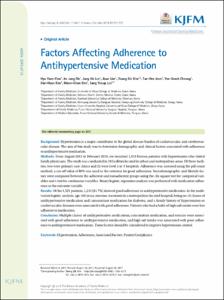KUMEL Repository
1. Journal Papers (연구논문)
1. School of Medicine (의과대학)
Dept. of Family Medicine (가정의학)
Factors Affecting Adherence to Antihypertensive Medication
- Keimyung Author(s)
- Kim, Dae Hyun
- Department
- Dept. of Family Medicine (가정의학)
- Journal Title
- Korean Journal of Family Medicine
- Issued Date
- 2018
- Volume
- 39
- Issue
- 6
- Abstract
- Background:
Hypertension is a major contributor to the global disease burden of cardiovascular and cerebrovascular disease. The aim of this study was to determine demographic and clinical factors associated with adherence to antihypertensive medication.
Methods:
From August 2012 to February 2015, we recruited 1,523 Korean patients with hypertension who visited family physicians. The study was conducted in 24 facilities located in urban and metropolitan areas. Of these facilities, two were primary care clinics and 22 were level 2 or 3 hospitals. Adherence was assessed using the pill count method; a cut-off value of 80% was used as the criterion for good adherence. Sociodemographic and lifestyle factors were compared between the adherent and nonadherent groups using the chi-square test for categorical variables and t-test for continuous variables. Binary logistic regression analysis was performed with medication adherence as the outcome variable.
Results:
Of the 1,523 patients, 1,245 (81.7%) showed good adherence to antihypertensive medication. In the multivariate logistic analysis, age ≥65 years, exercise, treatment in a metropolitan-located hospital, being on ≥2 classes of antihypertensive medication and concomitant medication for diabetes, and a family history of hypertension or cardiovascular diseases were associated with good adherence. Patients who had a habit of high salt intake were less adherent to medication.
Conclusion:
Multiple classes of antihypertensive medications, concomitant medication, and exercise were associated with good adherence to antihypertensive medication, and high salt intake was associated with poor adherence to antihypertensive medication. These factors should be considered to improve hypertension control.
- Keimyung Author(s)(Kor)
- 김대현
- Publisher
- School of Medicine (의과대학)
- Citation
- Hyo Yoon Choi et al. (2018). Factors Affecting Adherence to Antihypertensive Medication. Korean Journal of Family Medicine, 39(6), 325–332. doi: 10.4082/kjfm.17.0041
- Type
- Article
- ISSN
- 2092-6715
- Source
- https://www.kjfm.or.kr/journal/view.php?doi=10.4082/kjfm.17.0041
- Appears in Collections:
- 1. School of Medicine (의과대학) > Dept. of Family Medicine (가정의학)
- 파일 목록
-
-
Download
 oak-2018-1683.pdf
기타 데이터 / 248.52 kB / Adobe PDF
oak-2018-1683.pdf
기타 데이터 / 248.52 kB / Adobe PDF
-
Items in Repository are protected by copyright, with all rights reserved, unless otherwise indicated.